Related Research Articles
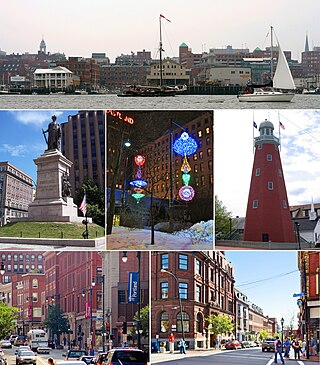
Portland is a port city and the most populous city in the U.S. state of Maine and the seat of Cumberland County. Portland's population was 68,408 in April 2020. The Greater Portland metropolitan area is home to over half a million people, the 104th-largest metropolitan area in the United States. Portland's economy relies mostly on the service sector and tourism. The Old Port is known for its nightlife and 19th-century architecture. The marine industry plays an important role in the city's economy, with an active waterfront that supports fishing and commercial shipping. The Port of Portland is the second-largest tonnage seaport in New England.

Cross Insurance Arena is a multi-purpose arena located in Portland, Maine. Built in 1977, at a cost of US$8 million, it is the home arena for the Maine Mariners of the ECHL. There are 6,206 permanent seats in the arena, and it seats up to 9,500 for concerts.

The Colisée is a 4,000 capacity multi-purpose arena, in Lewiston, Maine, that opened in 1958. The Colisée was built to replace St. Dominics Regional High School Arena, and initially constructed and operated by the Catholic parish of SS. Peter and Paul. Currently, it is the home of the Maine Nordiques of the North American Hockey League. The Colisee is also used for concerts, conventions and trade shows. There is 17,000 square feet of exhibit space. For conventions, the Colisee can accommodate up to 4,800 patrons.

Edward Payson Park is a 47.5-acre (19.2 ha) public park in the Back Cove neighborhood of Portland, Maine. The park is bordered by Ocean Avenue to the north and Baxter Boulevard to the south. The offices of the Roman Catholic Diocese of Portland are located across from the park on Ocean Avenue.
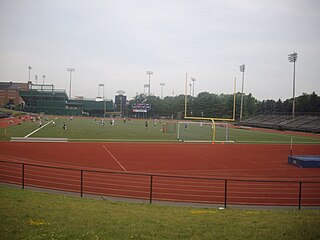
James J. Fitzpatrick Stadium is a 6,000 seat multi-purpose outdoor stadium in Portland, Maine, United States. It is located between Interstate 295, Hadlock Field baseball stadium, King Middle School, and the Portland Exposition Building. It is located across the street from Deering Oaks. Formerly known as Portland Stadium, it was renamed in 1989 to honor James J. Fitzpatrick, one of the most respected figures in Maine athletic history.

The Portland Exposition Building, also known as The Expo, is a sports and exhibition venue building complex in Portland, Maine. The complex includes five inter-connected buildings with 24,000 square feet of exhibition space and 10 meeting rooms. It is adjacent to the Hadlock Field and the Portland Ice Arena.
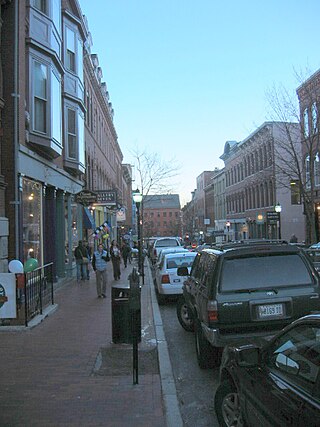
Exchange Street is a main commercial thoroughfare in the Old Port of Portland, Maine, U.S. It features a number of designer clothing stores, as well as several small, locally owned businesses. There are also a couple of coffee shops, one of which doubles as an Internet café. In the summer of 2015, an independent ballet school and dance studio opened, Exchange Street Studio.

Deering Center is a neighborhood in the residential area of Portland, Maine, United States.

Portland Public Library is the main library of the public library system in Portland, Maine, USA. It is located at 5 Monument Square on Congress Street in the Old Port of Portland, Maine. The library has three neighborhood branches, Burbank branch, Peaks Island branch, and Riverton branch.
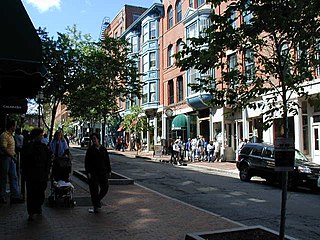
The Old Port is a district of Portland, Maine, known for its cobblestone streets, 19th-century brick buildings and fishing piers. The district contains boutiques, restaurants and bars. Because of its reputation for nightlife, the Old Port is a popular destination for tourists and locals alike.

The great fire of Portland, Maine, sometimes known as the 1866 great fire of Portland, occurred on July 4, 1866—the first Independence Day after the end of the American Civil War. Five years before the Great Chicago Fire, this was the greatest fire yet seen in an American city. It started in a boat house on Commercial Street, likely caused by a firecracker or a cigar ash. The fire spread to a lumber yard and on to a sugar house, then spread across the city, eventually burning out on Munjoy Hill in the city's east end. Two people died in the fire. Ten thousand people were made homeless and 1,800 buildings were burned to the ground. This included the federal Exchange Building by which was replaced with the custom house. Soon after the fire, poet Henry Wadsworth Longfellow described his old home town: "Desolation! Desolation! Desolation! It reminds me of Pompeii, the 'sepult city'."
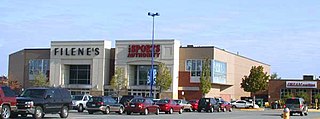
The Maine Mall is an enclosed shopping mall in South Portland, Maine, United States. Owned and managed by Brookfield Properties, it is the largest shopping mall in the state of Maine, and the second-largest in northern New England, behind New Hampshire’s The Mall at Rockingham Park.

The Maine Historical Society is the official state historical society of Maine. It is located at 489 Congress Street in downtown Portland. The Society currently operates the Wadsworth-Longfellow House, a National Historic Landmark, Longfellow Garden, the Maine Historical Society Museum and Store, the Brown Research Library, as well as the Maine Memory Network, an online database of documents and images that includes resources from many of state's local historical societies.
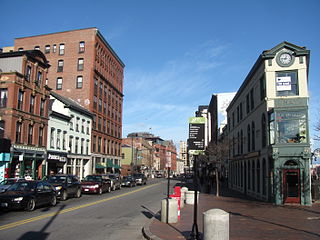
The Arts District is a section of downtown Portland, Maine’s designated in 1995 as to promote the cultural community and creative economy of the city. It covers a large part of upper Congress Street towards the West End. There are many art galleries, a theater company, museums, and schools in the general area. Both Maine College of Art (MECA) and Portland Museum of Art are located in the district. Congress Square Park, a small urban park across the street from the Museum of Art, often referred to as the "Heart of the Arts District," frequently hosts community-based arts and cultural events.
Portland, Maine, is home to many neighborhoods.

Congress Street is the main street in Portland, Maine. Congress stretches from Portland's southwestern border with Westbrook through a number of neighborhoods before ending overlooking the Eastern Promenade on Munjoy Hill. In March 2009, the Portland City Council designated much of the inner portion of Congress Street an historic district. The western section of the street includes the city's Arts District.
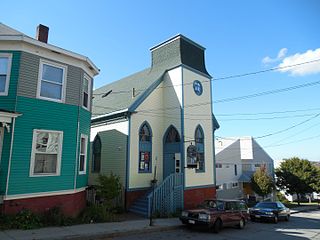
Mayo Street Arts is a community arts and performance venue in the East Bayside neighborhood of Portland, Maine. It was founded in 2010 by Blainor McGough after leasing the building which was formerly St. Ansgar Church. Mayo Street Arts' second executive director, Ian Bannon, succeeded McGough in May 2020 following McGough's resignation. Located next to Kennedy Park, a public housing development and close to many other public housing areas, Mayo Street Arts serves as a theater, concert venue, art gallery, and meeting space and offers affordable artist studios, rehearsal space, and a teaching platform for visual and performing artists of multicultural backgrounds. Programming is varied, but with a particular focus on puppetry, folk music, and dance.

The Press Herald Building is an historic building in Portland, Maine built in 1923 and expanded in 1948. It is strategically located across Congress Street from Portland City Hall. It was occupied by the Portland Press Herald newspaper until 2010. In 2015, the renovated building reopened as the Press Hotel.
References
- ↑ "Center for Cultural Exchange, 1999". Businesses & Buildings - Portland Press Herald Still Film Negatives. 3 February 1999.
- ↑ Sutherland, Amy (February 28, 1999). "Cultural Center Plans Heady Mix of Events". Portland Press Herald.
- ↑ Kelley, Michael (22 June 2021). "Things are looking up for One Longfellow Square". Press Herald.
- ↑ "How music lovers in Maine saved One Longfellow Square". newscentermaine.com. June 23, 2020.
- ↑ "One Longfellow Square fighting to stay afloat during pandemic". WGME. 16 June 2020.
43°39′11″N70°15′59″W / 43.65303°N 70.26644°W